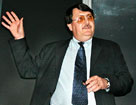|
Citing Texas A&M University's various research-based entities and their capabilities, Texas A&M Vice President for Research Richard E. Ewing said the university has a good chance of being named as a national center for homeland security.
Ewing, who spoke November 15 at the College of Architecture's fourth annual Global Symposium, said legislation for the establishment of a national center for homeland security was passed by the House of Representatives with language beneficial to Texas A&M. The legislation was to move to the Senate the following week.
Referring to the areas of interest a national center would emphasize, Ewing said, "We have enormous expertise in each of these topics."
Ewing's comments were part of a status report on the university's research initiatives. In addition, he provided updates on Texas A&M research projects such as the Technology Transfer and Commercialization Initiative.
The symposium, a showcase of research and scholarly accomplishment in Texas A&M's College of Architecture, featured 42 faculty presentations representing their academic endeavors from the 2001-2002 academic year.
"We believe that research informs teaching," noted Dean of the College of Architecture J. Thomas Regan. "The basis for this symposium is the hard work and intellectual power of our faculty."
Faculty presentations at the symposium, which provided insight into research initiatives under way in the college, focused on several topics. Among the topics addressed were past, present and future practices in architecture, construction technology, architectural theory, architectural education, computers and design, health facility design, planning, energy and construction, visual arts, history and historic preservation and hazards and planning.
Regan, who delivered a presentation on the new era of architectural education, said he believed that architecture is focusing more on evidence-based design, which entails making decisions based on how the world works physically and psychologically.
Regan also spoke of the shortcomings of colleges of architecture trying to make the transition to the new era. He said colleges of architecture are too small, too isolated, have too few disciplines and degree programs and focus too much on undergraduate education. In addition, there is too much of a focus on individual performance and too little use of a design studio teaching methods, he added.
The presentations were previously presented at scholarly meetings and academic institutions across the nation and throughout the world. In the four years since the event was organized, Texas A&M faculty members have made presentations in more than 35 nations and 38 states in the United States.
| |
 Richard E. Ewing,
Richard E. Ewing,
VP for Research at
Texas A&M University.
Click image to enlarge.
|